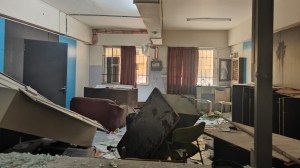School now a Right
As education became a fundamental right of every child between the ages of 6 and 14 in India today,Prime Minister Manmohan Singh called upon state governments....
As education became a fundamental right of every child between the ages of 6 and 14 in India today,Prime Minister Manmohan Singh called upon state governments,teachers,parents and guardians to help make the pathbreaking Right to Education Act a success.
Education is the key to success that empowers the individual and enables a nation,the Prime Minister said in his address to the nation. The implementation of Act,he said,demonstrated the governments national commitment to the education of our children and to the future of India.
To realise the Right to Education the government at the Centre,in the states and Union Territories,and at the district and village level must work together as part of a common national endeavour. I call upon all the state governments to join in this national effort with full resolve and determination. Our government,in partnership with the state governments,will ensure that financial constraints do not hamper the implementation of the Right to Education Act, the PM said.
Teachers and parents,he said,have to play the key role in the implementation of the Act.
The success of any educational endeavour is based on the ability and motivation of teachers. The implementation of the Right to Education is no exception. I call upon all our teachers across the country to become partners in this effort. It is also incumbent upon all of us to work together to improve the working conditions of our teachers and enable them to teach with dignity,giving full expression to their talent and creativity. Parents and guardians too have a critical role to play having been assigned school management responsibilities under the Act.
It was education that had made him what he was,the PM said.
I was born to a family of modest means. In my childhood I had to walk a long distance to go to school. I read under the dim light of a kerosene lamp. I am what I am today because of education.
Union Human Resource Development (HRD) Minister Kapil Sibal listed the challenges before the nation in achieving the goals of the historic legislation.
We need to get many more teachers… estimates are that we are currently short of some 5 lakh teachers. States also need to define what will constitute a neighbourhood school. Then there is the question of getting children who are exploited back into schools. There are also less privileged private schools to look at. So there is a lot of decision-making to be done. We are coordinating closely with the states on all issues,Sibal told reporters.
He added that the Centre would help the states in the collaborative effort. The Finance Commission had already released Rs 25,000 crore to states for the implementation of the RTE over the next five years,Sibal said.
The Minister said amendments to the Act would be moved in Parliament to exempt minority institutions from the ambit of the Act,and to cover all categories of disabled children under its provisions.
On pending litigation over the provision mandating that 25 per cent of seats in private schools would be reserved for disadvantaged children,Sibal said schools had as much of a right to approach courts as a child had to the fundamental right to education.
He added that the Ministry was evolving policies to allow private schools to gainfully employ their essential public assets to generate revenue,and for public benefit. This way,he said,reserving 25 per cent of seats would not result in a very big burden.


- 01
- 02
- 03
- 04
- 05





























